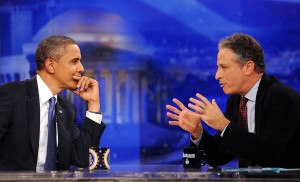Editor’s Note: This piece is a response to a New York Times op-ed written by Gerard Alexander on Aug. 7th.
If you ask Jon Stewart, he will tell you: he is biased. He is certainly liberal (in the American sense) and has admitted to holding some socialist beliefs. If he lived across the Atlantic, Stewart would likely find himself in a social democratic party. This is no secret.
University of Virginia associate professor of politics Gerard Alexander would have you think this is a secret based on his condemnation of Stewart’s unequal criticism of liberals. Last weekend, Alexander penned a New York Times op-ed in which he claims The Daily Show host emeritus “cultivated” his liberal audience’s “intellectual smugness by personifying it.” Although Alexander praises Stewart as talented, smart, and funny, he decries Stewart’s embodiment of a “particular smugness” that he could have expunged from American political discourse. With great talent, says Alexander, comes great responsibility.
Conservatives resist change. This is true for the fiscal, religious, and social varieties, among others. Whether you consider conservatives as emotional reactionaries to progress or the guardians against wanton, uninformed progress, all conservatives believe in the importance of tradition. Yet Alexander argues, “liberals believe that people on opposite sides of the ideological spectrum are fundamentally different. Specifically, they believe that liberals are much more open to change than conservatives, more tolerant of differences…and, maybe most of all, smarter and better informed.” Are liberals the only perpetrators of such a crime?
No. Liberal smugness is mythical in its qualification. The phrase reinforces the idea that smugness is unique to the left, when in reality stubbornness is ubiquitous in politics. The right often defends fiscal conservatism while sporting a knowing smirk in the face of left-wing spendthrifts. In his latest blog post for the Monkey Cage, Columbia University statistics and political science professor Andrew Gelman points out Alexander’s hypocrisy. “A characteristic feature of polarization,” writes Gelman, “seems to be the impression that one’s own side is reasonable and that all the polarizing comes from the other side of the political aisle.” When Alexander calls all liberals condescending, he stoops to the same level of supposed condescension.
Alexander’s op-ed is just as misinformed about political ideology as it is about comedy, and comedy is at issue here. He calls Stewart “unusually self-deprecating for his line of work,” when in fact some of the most successful stand-up comics and late night TV hosts (David Letterman, Conan O’Brien, Louis C.K., and Joan Rivers, to name a few) have relied on this comedic strategy. Alexander’s insistence that Stewart uphold his own supposed “claims to be objective” is ignorant of both ideology and performance. Of course Stewart only mocked “liberals’ tactics and implementation but not their underlying assumptions or ideas.” Why would he? If Stewart mocked the underlying ideological assumptions of his own belief system, he would betray himself and confuse the audience.
Stewart’s uncanny ability to expose hypocrisy might tempt some like Alexander to believe Stewart could have been more than a “cultural entrepreneur who provided those viewers with the validation they wanted.” Aside from calling Stewart a partisan hack, Alexander thinks Stewart could have united all Americans in opposition to hypocrisy in politics. But inevitably, what some consider hypocritical, others call completely reasonable. Stewart mocked conservatism and the media from a left-winger’s perspective, which informed his show’s humor. Most of his jokes’ premises could not resonate with conservatives because they were rooted in left-wing assumptions and targeted toward such an inclined audience. Stewart was and remains a stage performer who knows his audience. He did not have a responsibility to fairly represent conservatives who considered themselves unfairly represented. He could not have reconciled that with his own political leanings, his audience’s beliefs, and The Daily Show’s tone.
Alexander demands editorial balance from a political satirist who is a stand-up comedian at heart. In truth, he should demand such balance from the media whom Stewart most often mocked. Great influence does not necessarily entail great responsibility. Great power, on the other hand, does. The America news media has failed in its responsibility to deliver unbiased reporting, and instead continues producing sensationalized, editorialized, and divisive content. Alexander had high hopes for Stewart because Stewart blurred the line between comedy and journalism, and John Oliver has continued to muddy those waters. But for these comedians and others like them, nothing is ventured but everything is gained.
Stewart’s last episode as host of The Daily Show aired last Thursday. It included a parade of former correspondents, a Goodfellas-esque pre-recorded piece, and one last monologue. But Stewart’s final Moment of Zen was the most telling. As Bruce Springsteen’s familiar Jersey jams bounced off studio walls and a mob of Daily Show staffers, correspondents, and other celebrities danced like so many carefree teenagers, we—the audience—were reminded of something: this was entertainment. Jon Stewart owed us nothing but a reason to laugh, and we laughed for 16 years.
Image Sources: Comedy Central and Picture Group
